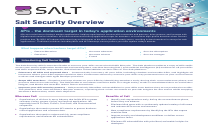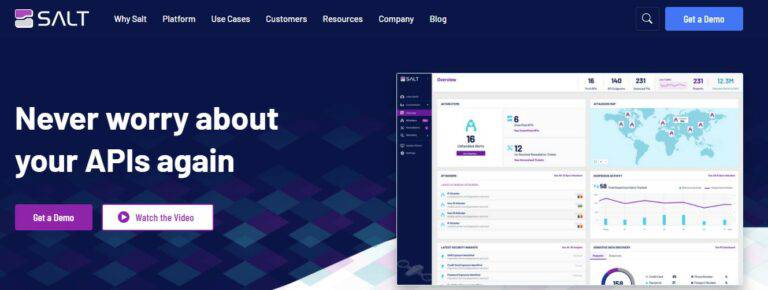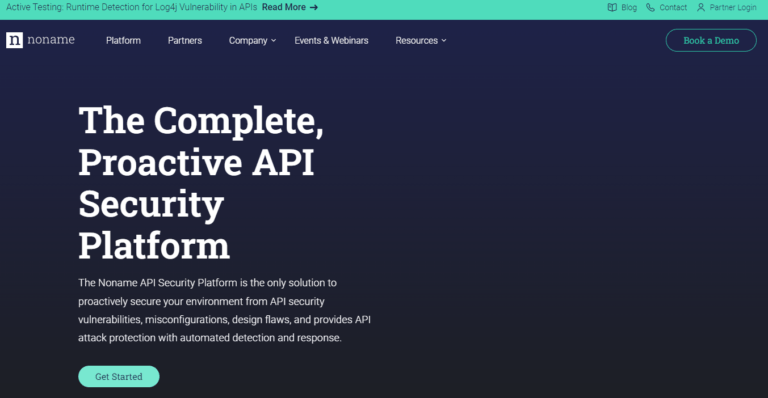
Salt Security
Founded Year
2016Stage
Unattributed VC | AliveTotal Raised
$280.74MMosaic Score The Mosaic Score is an algorithm that measures the overall financial health and market potential of private companies.
-46 points in the past 30 days
About Salt Security
Salt Security focuses on API security, providing a platform to protect APIs throughout their lifecycle. The company's services include API discovery, posture management, threat protection, incident response, and remediation insights, targeting sectors that rely on application programming interfaces for digital operations and data exchange. Salt Security was formerly known as Secful. It was founded in 2016 and is based in Palo Alto, California.
Loading...
Salt Security's Product Videos


ESPs containing Salt Security
The ESP matrix leverages data and analyst insight to identify and rank leading companies in a given technology landscape.
The WAAP market is focused on protecting the APIs that form the core of modern applications. This includes preventing next-generation API attacks and providing protection across build, deploy, and runtime phases. Solutions in this market offer unique API design analysis in pre-production, continuous monitoring for compliance, and the ability to detect and block bad actors before they reach their o…
Salt Security named as Leader among 15 other companies, including Akamai, Palo Alto Networks, and Check Point.
Salt Security's Products & Differentiators
Salt Security API Protection Platform
The Salt Security API Protection Platform, enables organizations to protect their APIs across build, deploy, and runtime phases. Through its unique API Context Engine (ACE) architecture, the Salt platform is able to discover all APIs and the sensitive data that they expose, identify API vulnerabilities in pre-production testing, stop API attackers, prevent data exfiltration, account takeovers, and service disruption, provide remediation insights, and simplify compliance. The platform taps its big data engine to collect and analyze the activity of millions of users in parallel, across millions of APIs. This architecture allows the Salt platform to piece together the subtle probing of an attacker during reconnaissance, assess the risk of their activity, and pinpoint and stop them early in their process.
Loading...
Research containing Salt Security
Get data-driven expert analysis from the CB Insights Intelligence Unit.
CB Insights Intelligence Analysts have mentioned Salt Security in 2 CB Insights research briefs, most recently on Feb 14, 2022.
Expert Collections containing Salt Security
Expert Collections are analyst-curated lists that highlight the companies you need to know in the most important technology spaces.
Salt Security is included in 2 Expert Collections, including Unicorns- Billion Dollar Startups.
Unicorns- Billion Dollar Startups
1,249 items
Cybersecurity
10,047 items
These companies protect organizations from digital threats.
Salt Security Patents
Salt Security has filed 1 patent.

Application Date | Grant Date | Title | Related Topics | Status |
|---|---|---|---|---|
4/13/2016 | 12/26/2017 | Application programming interfaces, Data modeling, Database management systems, Data management, Cyberwarfare | Grant |
Application Date | 4/13/2016 |
|---|---|
Grant Date | 12/26/2017 |
Title | |
Related Topics | Application programming interfaces, Data modeling, Database management systems, Data management, Cyberwarfare |
Status | Grant |
Latest Salt Security News
Oct 31, 2024
Security Boulevard Community Chats Webinars Library Securing APIs in Retail: Safeguarding Customer Data The retail industry’s digital transformation has made secure APIs essential to modern operations since they are at the core of this shift. APIs power everything from e-commerce platforms and mobile shopping apps to inventory management, point-of-sale systems, and personalized customer experiences. They help retailers stay agile in a fast-paced market by enabling seamless data exchange and streamlining processes. However, with the growing reliance on APIs comes an increasing set of security challenges that must not be overlooked. According to the Salt Security 2024 State of API Security Report , 25% of retailers are now developing, delivering, and integrating over 1,000 APIs. Additionally, a quarter of retailer respondents reported that the number of APIs in their organization has increased by 100%–200% in the last 12 months. This rapid growth in API usage highlights both the digital innovation in retail and the critical need for security measures to keep pace. The Growing Role of APIs in Retail Retailers depend heavily on APIs to connect their systems, optimize supply chains, and offer frictionless shopping experiences. They enable real-time updates for inventory management, payment processing, and even unique customer offers, providing a seamless shopping experience across any digital platform. However, this convenience comes at a cost—these same APIs can expose retailers to considerable security risks, making it critical for them to adopt strong API security measures. Key API Security Challenges for Retailers Retailers face unique challenges when it comes to API security: Data Sensitivity: Nearly 19% of retail organizations experienced an API security incident in the past 12 months. This is especially problematic as APIs in retail often handle sensitive customer data, including payment information, purchase history, and personal details. This data breach can lead to severe financial losses, hefty regulatory fines, and a damaged reputation. The potential financial losses, regulatory fines, and damage to brand reputation make data protection a top priority. API Discovery: A staggering 56% of retail organizations do not have a process in place to discover APIs across their organizations. Without visibility into all APIs, shadow or rogue APIs can remain unsecured, creating opportunities for cybercriminals to exploit vulnerabilities. Additionally, only 12.5% of retail respondents are confident that their API inventories are complete, underscoring the need for better discovery practices. High Transaction Volumes and Seasonal Spikes: Retailers experience fluctuating transaction volumes, especially during peak shopping seasons (ex. Black Friday or big holidays). APIs must handle this increased demand without compromising performance or security, making them potential targets for cybercriminals. Balancing performance with security is key, as 31% of respondents update their primary APIs every few months or less frequently, which can leave gaps in protection. Complex Ecosystems: Retailers frequently work with multiple third-party vendors, from payment gateways to logistics providers. Each integrator introduces potential security vulnerabilities, making maintaining a secure API environment harder. Interestingly, nearly 69% of respondents have delayed the rollout of new applications due to API security concerns, which points to most retailers feeling they do not have a good handle on their API ecosystems. Evolving Threat Landscape: As cybercriminals become more advanced, they develop new techniques to exploit vulnerabilities in retail APIs. Yet, only 6% of retail organizations have an advanced security strategy for their API development program. In comparison, 25% of retail respondents said that their existing security tools effectively prevent API attacks. This leaves a significant portion of the industry needing adaptive and proactive security measures to stay ahead of these evolving threats. Why Retailers Need Salt Security for API Protection To address the unique security challenges in retail, Salt Security provides an AI-driven API security platform designed specifically for retailers’ needs. Here’s how Salt Security empowers retailers to safeguard their APIs: API Discovery: With 56% of retailers lacking a process to discover APIs across their organization, Salt Security’s ability to continuously monitor and automatically discover all APIs within your ecosystem, including hidden or outdated “shadow” and “zombie” APIs, is critical. By providing full visibility, Salt ensures that no API goes unprotected, reducing potential exposure to cyber threats. API Posture Governance: Maintaining a secure API posture is crucial. Salt Security identifies and helps remediate API misconfigurations and vulnerabilities before they can be exploited. Salt ensures that retailers maintain a strong security posture by enforcing security policies and addressing compliance gaps. API Behavioral Threat Protection: Salt Security employs AI and machine learning to analyze real-time API traffic and detect threats that traditional security tools often miss. By recognizing abnormal behavior and potential threats, Salt helps prevent data breaches, fraud, and inventory manipulation. What Sets Salt Security Apart Ecosystem Integration: Salt Security integrates seamlessly with existing retail security tools, enhancing the overall security ecosystem with real-time API threat detection and response capabilities. This added layer of security protects against potential breaches and strengthens the retailer’s defense mechanisms. Scalability and Performance: With its cloud-native architecture, Salt Security easily scales to handle the high transaction volumes and seasonal demand spikes common in retail. This ensures uninterrupted performance even during peak shopping periods. Regulatory Compliance: Salt Security helps retailers meet stringent regulatory standards like PCI DSS by offering robust reporting and auditing features. This reduces non-compliance risk, ensuring retailers avoid penalties and legal exposure. Conclusion In the fast-paced retail industry, where customer trust and data protection are critical, API security must be a top priority to ensure both reliability and a seamless customer experience, confidence, and trust in digital services. Salt Security empowers retailers to confidently embrace digital innovation while protecting their APIs, customers, and brand reputation. With Salt Security’s AI-driven platform, retailers can confidently navigate API security challenges, keeping their operations running smoothly and securely, even during peak seasons. If you want to learn more about Salt and how we can help you on your API Security journey through discovery, posture governance, and run-time threat protection, please contact us , schedule a demo , or check out our website . *** This is a Security Bloggers Network syndicated blog from Salt Security blog authored by Alexandria Nicosia . Read the original post at: https://salt.security/blog/securing-apis-in-retail-safeguarding-customer-data
Salt Security Frequently Asked Questions (FAQ)
When was Salt Security founded?
Salt Security was founded in 2016.
Where is Salt Security's headquarters?
Salt Security's headquarters is located at 3921 Fabian Way, Palo Alto.
What is Salt Security's latest funding round?
Salt Security's latest funding round is Unattributed VC.
How much did Salt Security raise?
Salt Security raised a total of $280.74M.
Who are the investors of Salt Security?
Investors of Salt Security include CrowdStrike Falcon Fund, Y Combinator, S Capital VC, Sequoia Capital, Tenaya Capital and 13 more.
Who are Salt Security's competitors?
Competitors of Salt Security include Noname Security, Traceable AI, Wib, Wallarm, Corsha and 7 more.
What products does Salt Security offer?
Salt Security's products include Salt Security API Protection Platform.
Who are Salt Security's customers?
Customers of Salt Security include Finastra and DeinDeal.
Loading...
Compare Salt Security to Competitors

Cequence is a company specializing in API security and bot management within the cybersecurity industry. The company offers a Unified API Protection solution that encompasses discovery, compliance, and protection against attacks, business logic abuse, and fraud for applications and APIs. Cequence primarily serves sectors such as automotive, financial services, healthcare, online dating, public sector, retail, and telecom across different business sizes, from SMBs to enterprises. Cequence was formerly known as Stealth Security. It was founded in 2014 and is based in Sunnyvale, California.

Traceable AI specializes in API security solutions within the cybersecurity industry. The company offers a platform that provides API discovery, threat detection, attack protection, fraud and bot security, and API testing services. Traceable AI primarily serves sectors such as finance and banking, government and public sector, healthcare, high tech, and retail and eCommerce. It was founded in 2018 and is based in San Francisco, California.

ammune.ai operates as a cybersecurity company. The company provides services to help organizations protect their infrastructure, applications, customers, employees, and partners from application program interface (API) borne attacks using autonomous artificial intelligence (AI) based solutions. It was formerly known as L7 Defense. It was founded in 2015 and is based in Jersey City, New Jersey.

Ever.Security is a company that focuses on digital security and intelligence within the technology industry. The company offers services such as risk intelligence platforms and API security control platforms, which help businesses cover security blind spots and respond to new risks and challenges. The company primarily serves the cybersecurity industry. It was founded in 2017 and is based in Shenzhen, Guangdong.

Apoxy is a company focused on providing solutions for API monitoring and management within the tech industry. Their platform offers tools for observing and securing API calls, as well as facilitating the evolution of API services. The company primarily caters to developers and businesses looking to enhance their API infrastructure. It was founded in 2023 and is based in San Francisco, California.
Aiculus is a company that specializes in API security within the technology and cybersecurity industry. The company offers a security solution that uses artificial intelligence to detect and respond to API security threats in real time, providing insights into API-related threats and offering adaptive risk assessments. Aiculus primarily serves sectors such as security teams, executives, and small to medium-sized businesses. It was founded in 2018 and is based in Singapore.
Loading...

